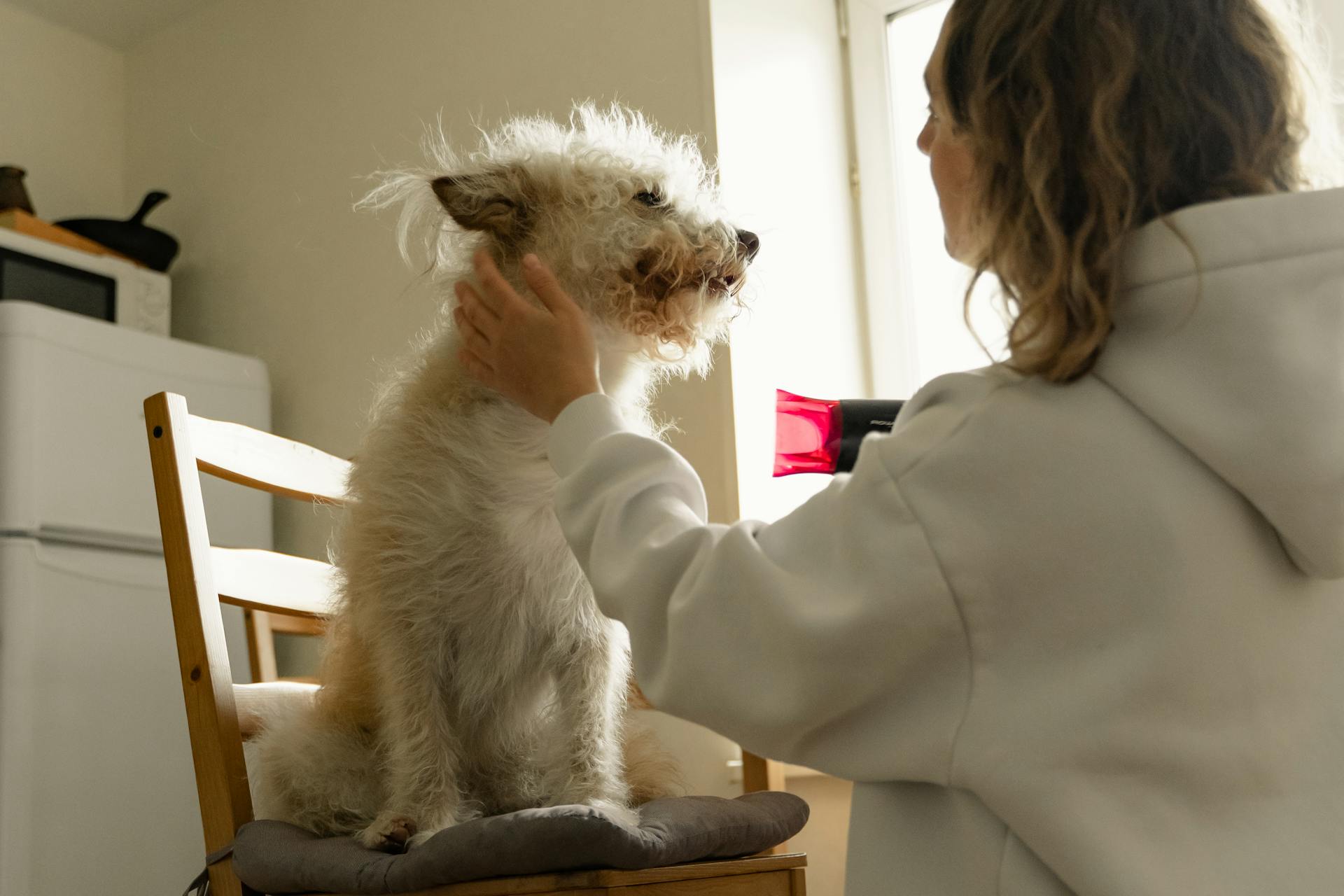
Dogs can indeed catch C. diff from humans, and it's a serious concern for pet owners and their furry friends.
C. diff, or Clostridioides difficile, is a bacterium that can cause severe diarrhea and colitis in dogs, just like in humans. The risk of transmission is higher if the dog has a weakened immune system or is already sick.
If your dog catches C. diff from you, the symptoms can appear within 2-14 days, and can range from mild to severe diarrhea, abdominal pain, and weight loss. In severe cases, C. diff can cause life-threatening complications in dogs.
The good news is that with proper treatment and care, most dogs can recover from C. diff infections.
Understanding the Risks
Dogs can indeed transmit certain illnesses to humans through their feces, including gastrointestinal bugs, parasitic diseases, and drug-resistant bacteria. These germs can cause a range of symptoms, from diarrhea to cysts and lesions in various organs.
Some of the most common illnesses that spread from dog to human through fecal transmission are gastrointestinal bugs, including Salmonella, Campylobacter, and Giardia. These germs can cause gastroenteritis in humans.
Here are the three most common illnesses that spread from dog to human through fecal transmission:
- Gastrointestinal bugs – including Salmonella, Campylobacter, Giardia
- Parasitic diseases – including giardiasis, toxocariasis, cutaneous larva migrans, echinococcosis and dipylidiasis
- Drug-resistant bacteria – including metronidazole-resistant C. difficile and carbapenem-resistant Enterobacteriaceae
It's worth noting that some parasitic worms, like roundworms, tapeworms, and hookworms, can also shed their eggs in a dog's feces, putting humans at risk for infection.
What is C Diff?
C Diff, short for Clostridioides difficile, is a type of bacteria that can cause diarrhea and colitis.
It's a common cause of hospital-acquired infections, particularly in older adults and those with weakened immune systems.
Recommended read: Can Dog Food Cause Diarrhea in Dogs
How is C Diff Transmitted
C Diff can be transmitted through touch, so it's essential to wash your hands frequently, especially after using the bathroom and before eating.
The bacteria can survive for months on surfaces like doorknobs, light switches, and remotes, making it easy to spread.
C Diff can also be transmitted through contaminated food and water, so it's crucial to handle and prepare food safely.
The bacteria can be spread through contact with an infected person's feces, which is why healthcare workers are at high risk of transmission.
C Diff can also be spread through the air, particularly in hospitals and healthcare facilities, where the bacteria can become airborne and be inhaled.
On a similar theme: Food Seasoning for Dogs
Your Dog's Feces Contain Infectious Germs
Your dog's feces can contain infectious germs, just like in humans. These germs can cause diarrhea in dogs and even lead to illness in humans.
Some parasitic worms, like roundworms, tapeworms, and hookworms, can shed their eggs in a dog's feces, putting you at risk for infection while cleaning up after your pet.
In fact, the three most common illnesses that spread from dog to human through fecal transmission are:
- Gastrointestinal bugs – including Salmonella, Campylobacter, and Giardia
- Parasitic diseases – including giardiasis, toxocariasis, cutaneous larva migrans, echinococcosis, and dipylidiasis
- Drug-resistant bacteria – including metronidazole-resistant C. difficile and carbapenem-resistant Enterobacteriaceae
These germs can cause a range of symptoms, from diarrhea to cysts and lesions in various organs. If you're not careful, you could be at risk for infection while cleaning up after your dog.
Antimicrobial Resistance
Antimicrobial Resistance is a growing concern, and it's especially relevant when it comes to treating C. difficile infections.
High percentages of C. difficile strains isolated from dogs show resistance to certain antimicrobials, with 46.24% resistant to clindamycin and 29% resistant to metronidazole.
These resistant strains belong to the RT-010 type, which is a worrying development since metronidazole is often the antibiotic of choice for treating mild to moderate C. difficile infections in humans.
The spread of these resistant strains and the potential transferability of resistance to pathogenic strains definitely deserve attention, and it's essential to monitor the situation closely.
Research and Findings
Dogs can indeed catch C. diff from humans, but the risk is relatively low.
Studies have shown that dogs can become colonized with C. diff spores, but they rarely develop symptoms.
The main factor determining the likelihood of a dog catching C. diff is its proximity to its owner with the infection.
Izvve Research
The IZSVe Research project is a fascinating study that aims to understand the transmission of Clostridium difficile from dogs to humans. The project was conducted in the Veneto Region of Italy, where researchers collected 143 human faecal samples that had already tested positive for C. difficile in hospital laboratories.
Researchers also collected 996 samples from dogs, which is a significant number. They were taken from public or private kennels, veterinary surgeries, clinics, and even dogs used for pet therapy.
The project focused on characterizing C. difficile strains isolated from both humans and dogs. By doing so, they aimed to identify the molecular characteristics and toxin-producing abilities of these strains.
A total of 226 strains of C. difficile were isolated during the project. This is a notable finding, as it highlights the importance of understanding the epidemiology of this pathogen.
The researchers built two collections of C. difficile strains: one from human samples and another from dog samples. The human collection consisted of 133 strains, while the dog collection had 93 strains.
Ribotypes
Ribotypes play a crucial role in identifying the different strains of Clostridium difficile.
The majority of human cases are caused by RT-018, which accounts for 53.2% of all cases.
In dogs, RT-010 is the most frequent ribotype, making up 55.9% of all strains isolated.
RT-014/020 is a common ribotype found in both dogs and humans, and it's a producer of toxins.
This ribotype is particularly concerning because it's also the most frequently associated with human infections in Europe.
Interestingly, 70% of the strains isolated from dogs are non-toxic and therefore cannot induce disease in carrier subjects.
Frequently Asked Questions
What are the symptoms of C. diff in dogs?
Common symptoms of C. diff in dogs include large-bowel diarrhea with mucus and blood, frequent straining to defecate, and a sense of urgency. If you suspect your dog has C. diff, seek veterinary attention to confirm diagnosis and treatment.
Is it OK to be around someone with C. diff?
Most healthy adults can be around someone with C. diff without getting sick, but it's still possible to pick up the germs
Can humans pass bacterial infections to dogs?
Yes, humans can pass bacterial infections to dogs, including salmonellosis and MRSA, which can cause illness in dogs. Learn more about the risks and how to protect your furry friend.
Sources
- https://www.houstonmethodist.org/blog/articles/2021/apr/can-my-dog-get-me-sick/
- https://www.izsvenezie.com/clostridium-difficile-dogs-humans/
- https://www.hcplive.com/view/intra-species-spread-c-difficile-rare-between-owners-pets
- https://www.hcplive.com/view/potential-transfer-of-clostridium-difficile-from-dog-cat-to-household-owners
- https://blogs.cdc.gov/publichealthmatters/2009/04/clostridium-difficile-an-emerging-zoonosis/
Featured Images: pexels.com


